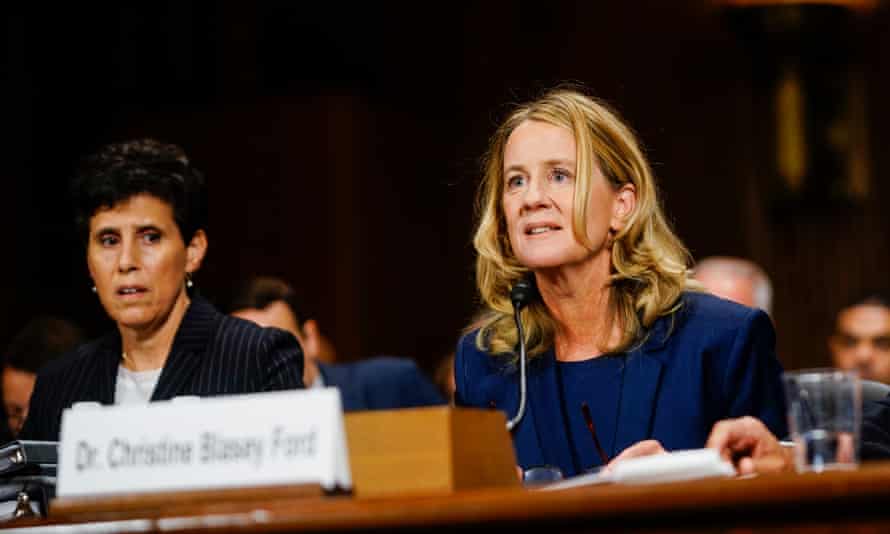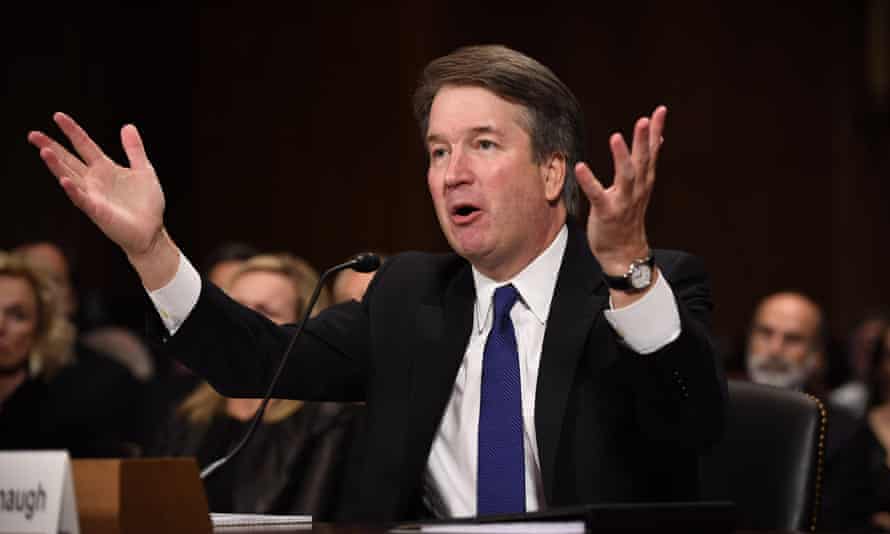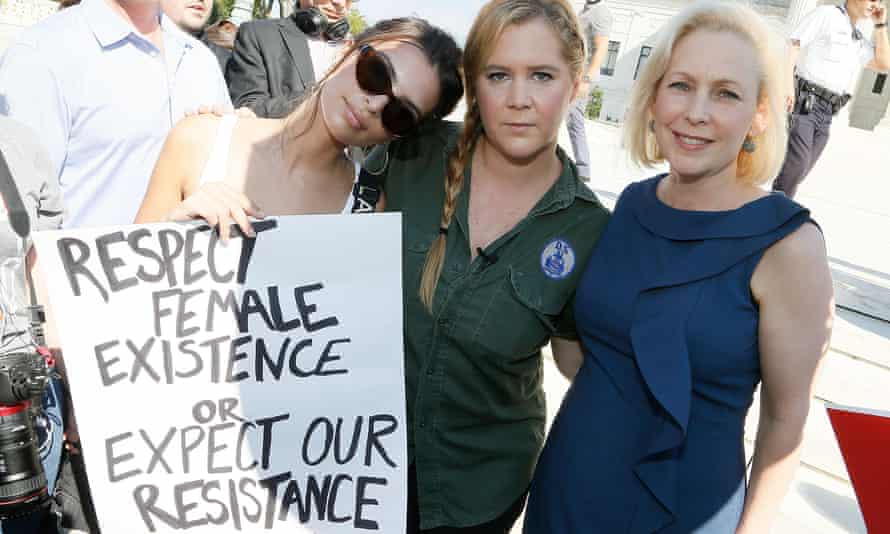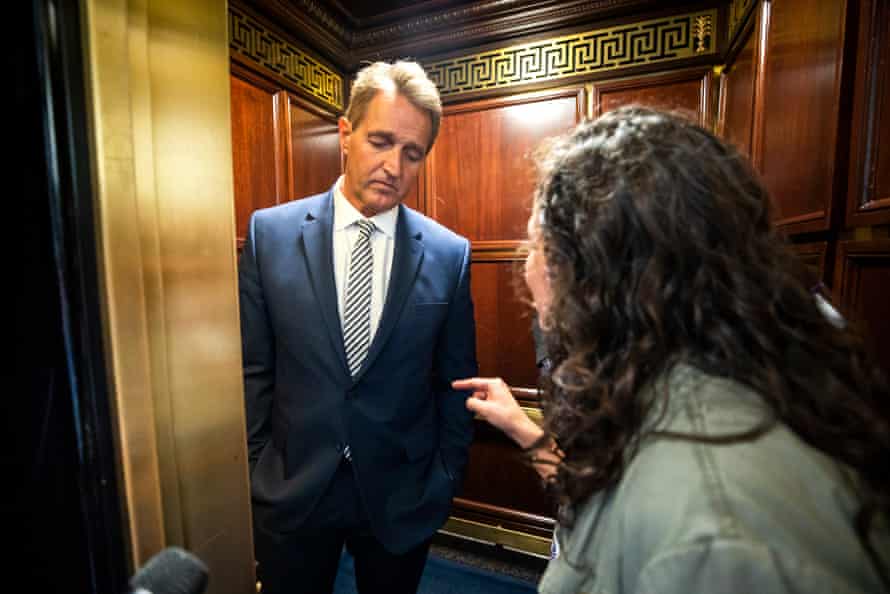Adult Cartoon Painting Lady Justice Raped by Courts
I f you have just been raped and you would like to pursue justice, I hope you know what to do. When the rape is over, do not wash, brush your teeth, eat, drink or smoke. Do not change your clothes or clear up any mess. If you can help it, do not go to the toilet.
Intellectually, I understand this advice; no one wants to wash away forensic evidence. But I have never met a woman, or indeed a man, who, after being raped, didn't immediately shower or sit in the bath scrubbing themselves, trying to wash away the sins of the perpetrator. The victim might often then choose to tell no one; sometimes for years, sometimes for ever.
In the past month, we have watched as Christine Blasey Ford gave evidence, before the eyes of the world, about an alleged sexual assault when she was 15, at a house party. This was a party she was not meant to have been attending, and the incredulity with which her account was greeted by some – including Donald Trump, who mocked her at a rally – struck me as false, because the idea that she would not have spoken out as a teenager is entirely plausible. But then recently we have found out, repeatedly, how little some men know, or want to know, about women's lives.
Over the past year, the #MeToo movement and the Time's Up initiative have enabled famous women to speak out, then ordinary women, too. There has never been a moment in history when more people have publicly shared their experiences of sexual assault. All of us who have been hassled, molested and assaulted, pre- and post-puberty, all of us who have felt ready to put up our hands and say "me too", have embraced a hashtag that has enabled us to connect and show the ubiquity of rape. No more hiding, no more shame; what has been done to us hurts and keeps hurting, and there is solace in sharing.
The Brett Kavanaugh hearing triggered the latest in several waves of testimony that have broken over the past six years. Katie Russell, a spokeswoman for the charity Rape Crisis England and Wales, says that, in 2012, the Jimmy Savile story brought a spike in calls to the service, followed by another in 2017, when news broke of multiple sexual assault allegations against Harvey Weinstein and other Hollywood figures.
But we have yet to see much justice. Weinstein is still to go on trial, let alone go to prison; one of the charges against him was dropped by prosecutors earlier this month. Bill Cosby is finally in prison, but how many women's accounts of abuse and harrassment does it take to convict a powerful man? More than 60, if the Cosby case is anything to go by. While Blasey Ford has faced death threats and gone into hiding, her alleged assailant, Kavanaugh, has been confirmed to the US supreme court, a lifelong position of extraordinary power.

The justice system works differently in every country, but worldwide we still see a problem with securing justice for those who have been raped or sexually assaulted. I recently read Rape Crisis's statistics for England and Wales for 2017-18 alongside personal testimonies from Guardian readers, memories shared on this website as a result of the Kavanaugh hearing:
"I was seven months pregnant when I was told to lie on the floor …"
"Approximately 85,000 women and 12,000 men are raped in England and Wales alone every year; that's roughly 11 rapes (of adults alone) every hour. These figures include assaults by penetration and attempts."
"What came roaring to the surface refuses to subside: my mother and sisters were also raped."
"Rape Crisis specialist services were accessed by 78,461 individuals - an increase of 17% from 2016-17."
"I was sodomised at 11 by a family friend. I didn't even know I had a vagina. I was given a [sanitary towel] for the bleeding."
"One in five women aged 16-59 has experienced some form of sexual violence since the age of 16."
On and on it goes, until I want to scream – and still only 15% of those who experience sexual violence report it to the police.
We are talking more about sexual violence, but what are the consequences for those who commit it? In England and Wales, there has been a surge in the number of rape cases reported and yet the number of suspected rapists being charged by the Crown Prosecution Service is at its lowest for a decade. According to the CPS's annual report Violence Against Women and Girls, the organisation charged 849 fewer defendants in 2017-18 than in the previous year – a fall of 23.1%. The CPS has advised prosecutors to avoid what it calls "weak cases", but experts and campaigners fear this could lead to cases involving younger victims, students, or those with mental health issues going unheard. What's more, late last year, the CPS was due to launch a national training course to deal with the issue of cases where women were intoxicated when they were attacked, but this was abandoned without explanation.

As more women in the public eye have come forward, the treatment of rape victims has been newly visible, and often ugly. Nazir Afzal, who successfully prosecuted the Rochdale grooming gang, says the treatment of Blasey Ford will affect the confidence of survivors worldwide when it comes to testifying in court. "The impact is that many women and girls just see the authorities putting them on trial and think: 'What's the point?' We go back a decade."
In the legal system in England and Wales, it has always been the case that the lives and motives of rape victims are picked over by the authorities in a way that simply doesn't happen with other crimes. Report an assault to police in England and Wales in 2018 and there is every chance they will expect a "Stafford statement" – permission for your personal records to be accessed. You hand over your phone and computer; they may even ask for school reports and counselling notes. It doesn't happen everywhere, but police in some cases are demanding to go through thousands of text messages before going ahead with a case; trials are collapsing when the messages are then used to undermine a victim. And even if this doesn't happen, the amount of disclosure required is completely off-putting.
Then there is the time a case may take. On average, the time between the victim reporting a rape and the suspect being charged is now 78 days, up from 63 in 2016-17, and then it takes another 11 months for the case to conclude. It is not unusual for a rape case to take two years from being reported to coming to trial. Are police really telling 15-year-old girls they may have to wait two years to get to court? Prosecutors are told by the CPS to take cases where they know they will get a conviction, but this effort to make the statistics look better is a toxic situation for women. Juries are also less likely to convict young men.
There is a deficit of justice and a deficit of support. Rape Crisis has a waiting list for its counselling services. The fallback is the NHS – where mental health services have been cut to the bone. In other words, sexual violence has a clear impact on scant mental health resources. To put it bluntly, each rape costs £96,000, according to the Home Office Sexual Violence Plan.

The culture over the past few years has given us many messages about believing women and girls. Women now speak out in the hope of preventing it happening again, almost as a moral responsibility. Telling our stories may indeed have therapeutic value, for us and for others. But what good is this if nothing concrete happens? As Harriet Wistrich, a solicitor and director of the Centre for Women's Justice, says: "The CPS is in crisis, expectations have been rising, but there are fewer prosecutions."
That the government, the state and its institutions lag way behind the culture is not really a shock. That it is getting worse, is. We need to wake up to this fundamental conflict. What, finally, is the deterrent for rapists in our culture? We can talk about early education and consent, but this isn't enough, and it is not up to survivors to end sexual violence. "We need solidarity and support," says Wistrich. "We need to get out on the street."
We need to challenge the amount of disclosure that women are now expected to give, and the belief that intoxication is consent, that certain kinds of women are "unrapeable". We need the CPS to step up and explain its strategy and lack of training programmes and to be accountable. In other words, we need a joined-up system.
After Blasey Ford gave her testimony, ordinary women as well as celebrities such as Amy Schumer occupied buildings and were rounded up and arrested. Victims confronted Senator Jeff Flake in a lift, and, shaken, he asked for a delay to proceedings. These moments may be symbolic, but they are also powerful. There is safety in numbers. Electorally, we will see how powerful in the US mid-terms next month.

Not every rape is the same, not everyone is traumatised for ever, not every one wants to go to court, but surely no one wants another person to go through what women are currently being required to endure. Rape culture is a culture in which rape carries few consequences and that is precisely where we are in 2018. The narrative of the falsely accused man – a "serious but rare" occurrence, according to the CPS; around 3% of 1,149 cases, the Ministry of Justice estimated in 2012, may have been malicious – is still more powerful than the fact of falling convictions.
Victims can be destroyed in more ways than one. Justice for women is ever harder to come by. The war on women is waged partly by stealth, but often right before our eyes. We have the option to look away and not to scream or make a fuss, not to struggle in case we get more hurt, keep quiet. But just know that, as Audre Lorde said, your silence will not protect you. And the law will not protect you.
We need to fight back.
Adult Cartoon Painting Lady Justice Raped by Courts
Source: https://www.theguardian.com/society/2018/oct/22/rape-why-isnt-justice-being-done
0 Response to "Adult Cartoon Painting Lady Justice Raped by Courts"
Post a Comment